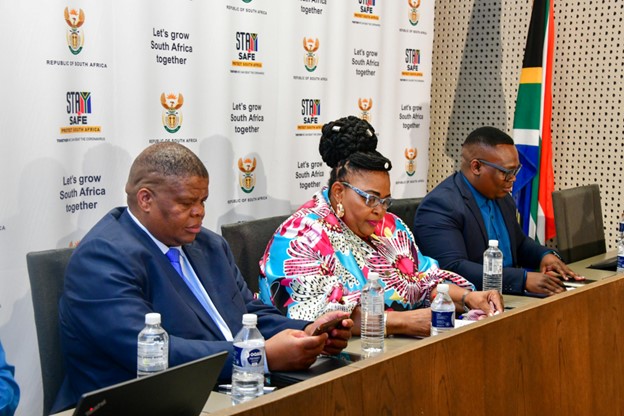By Thapelo Molefe
Water and sanitation minister Pemmy Majodina maintains that there is no drought or Day Zero scenario in Gauteng, saying, however, that the province is facing significant water security challenges.
Majodina was delivering her department’s 100-day performance review.
“There is no drought in Gauteng; however, the province is facing significant water security challenges,” said Majodina.
She added that ageing infrastructure, illegal mining, water losses, and credit management issues were some of the factors that have intensified pressures on water supply.
Majodina said her department has now launched a comprehensive programme to address these issues, including upgrading infrastructure, enforcing water restrictions, and strengthening governance.
She said that during the recent site visit to Hammanskraal in August, her ministry oversaw a R750 million project aimed at improving water quality and supply for the community.
The initiative, managed by the Magalies Water Board, focused on expanding water treatment capacity to the entire northern region of Tshwane.
Majodina added that the project represented “a significant investment to ensure the provision of clean drinking water for the community.”
She said her ministry also inspected progress at the Rooiwal WasteWater Treatment Works, where a refurbishment project by the Tshwane Municipality is currently underway.
The Phase One of the Rooiwal project, set to be launched on 16 November 2024, is expected to provide an additional 125 megalitres of water to address water scarcity in the area.
The City of Tshwane has already approved and allocated R450-million – over a three-year period – from the city’s Urban Settlements Development Grant to support the project and a partnership has been entered into with the Department of Water and Sanitation and the DBSA to secure the balance.
According to the water and sanitation ministry, the full rehabilitation of the Rooiwal Water Treatment Works will cost an estimated R4-billion, to be undertaken in three stages.
Meanwhile, Majodina announced that her ministry’s intervention also extended to Emfuleni, where a R7.5 billion initiative led by Rand Water under Section 63 of the Water Services Act aims to address sewage pollution issues.
She said during a site visit to Emfuleni in August, the project had already yielded results, reducing sewage spillages in streets and homes.
“The frequency and extent of sewage pollution have been greatly reduced, but work continues to completely eradicate these issues,” said Majodina.
A Special Purpose Vehicle, jointly established by Rand Water and Emfuleni Local Municipality, is set to strengthen governance and finance, with approval pending from the National Treasury.
In a broader effort to address water supply challenges, the water and sanitation ministry reported that it has participated in a Provincial Water Imbizo in September, bringing together all 11 municipalities in Gauteng to discuss collaborative solutions.
“The Imbizo provided a platform for all relevant stakeholders to align on the causes of Gauteng’s water issues and forge practical solutions,” Majodina stated.
She said her ministry has also spearheaded the establishment of the Platform for a Water Secure Gauteng, an initiative to enhance public communication and promote water conservation.
A public dashboard and information repository on the ministry’s website provide updates on water supply issues, and an awareness campaign is underway to encourage water-saving behaviours across the province.
“Water is life and sanitation is dignity. All South Africans are called upon to treat water as a precious resource and to use it sparingly,” said Majodina.
INSIDE METROS

